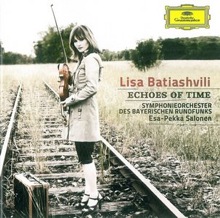
The violinist Lisa Batiashvili is peripatetic, in more ways than one. Born in Soviet Georgia, moved to Germany, now in France (with stints in a couple of other countries), for a player of her caliber she’s turned up on a surprising number of record labels in her roughly 10-year recording career. A debut album on EMI was followed by several with Sony, with side appearances on the independent labels BIS and Ondine. Now comes her first recording for Deutsche Grammophon, titled Echoes of Time.
In many ways it’s a strange program: one big piece and four short ones; three with orchestra and two without; five completely different idioms (because the two Shostakovich works here belong to radically different worlds); and, really, nothing to hold it all together but the presence of Batiashvili and the fact that all the composers lived and worked under Soviet power. (Even then, Rachmaninov’s familiar Vocalise was written years before there was such a thing as the USSR, and Giya Kancheli’s V & V after its collapse.) As a concert, or even conventionally understood as an album, it doesn’t make a lot of sense.
Listen To The Music
Shostakovich: Violin Concerto No.1 III, Passacaglia (excerpt)Pärt: Spiegel Im Spiegel (excerpt)
Purchase Recording


A portion of each purchase helps
support San Francisco Classical Voice
What does make sense is the quality of the music and of the playing. Think of it as “music Lisa Batiashvili loves and plays extremely well,” and the idea of putting together something like this for her debut album on this major label seems less nuts. There’s a personality here, and an interesting one.
The big piece is Shostakovich’s First Violin Concerto, and Batiashvili (with Esa-Pekka Salonen conducting the Bavarian Radio Symphony) gives it the finest performance I’ve heard in many years. The soloist is a “grand-student” of the original dedicatee — she studied with Mark Lubotsky, who studied with David Oistrakh. Her tone isn’t quite Oistrakh-rich, but her control of quiet legato, and especially of pacing, compares well with his. The cadenza from the third into the fourth movement is an object lesson in how to build tension without peaking too soon.
Meanwhile, the fast movements are razor-sharp, and incisive without overplaying. Batiashvili avoids harshness while never sounding as though she’s pulling her punches. (And the balances are realistic; there’s none of that supersized Gigantiviolin business that, even now, engineers sometimes slip into.)
Throwing in a Shostakovich waltz from a set of children’s pieces — orchestrated for her by her father — was a sweet touch. Sensibly, she put something else in between. Going directly from the Concerto to that giddy bit of frippery (or the other way around, for that matter) would have been cruel to both pieces.
The “something else in between” was Kancheli’s V & V, a 1995 work for violin, string orchestra, and recorded voice that I’d not heard before. Batiashvili hails from Georgia, and clearly she has a strong attachment both to her birth nation and to its music, though Kancheli is the only Georgian composer here.
The recorded voice (of a Georgian folk singer named Gomashvili) enters only at the beginning and the end of the 11-minute work. His singing is gentle and open, and seems not at all out of place among the strings. In between his appearances the music is mainly quiet and slow, but with sudden flare-ups of drama. The orchestral strings will devolve suddenly into angry, tone-clustery music, or the soloist into a passage of frenetic activity.
The last third or so of the piece is positively seraphic music: all high solo violin harmonics over a hushed string backdrop. But for some reason, in the last half-minute or so, Kancheli veers to a different key, and the piece ends, rather inconclusively, there. I found that perplexing, but there’s no denying the beauty of much of the piece.
If the Kancheli seemed to me lovely without quite convincing me, Arvo Pärt’s 1978 Spiegel im Spiegel (Mirror in a mirror) is, within its delicate, limpid realm, the nearest thing to perfection I can think of. There is so little here — slow broken chords in the piano, with a few notes periodically struck above and below that unbroken line, and yet-slower scales in the violin. The whole is 10 minutes of hypnotic serenity. I was glad to encounter it again, with Batiashvili and Hélène Grimaud at the piano, both gently patient and loving. (I swear, every time I start getting irritated with “minimalism” in general, I stumble across a performance of Spiegel im Spiegel, and have my perspective restored.)
After that, I confess that the disc-ending Rachmaninov feels somehow over-fussy — not the performance, which is as smooth and elegant as anyone could want, but the music. It made me wonder whether throwing all these radically different works together, forcing them into one another’s company, might not after all have been Batiashvili’s point. The Soviet (and post-Soviet) musical universe is a large place, indeed.

